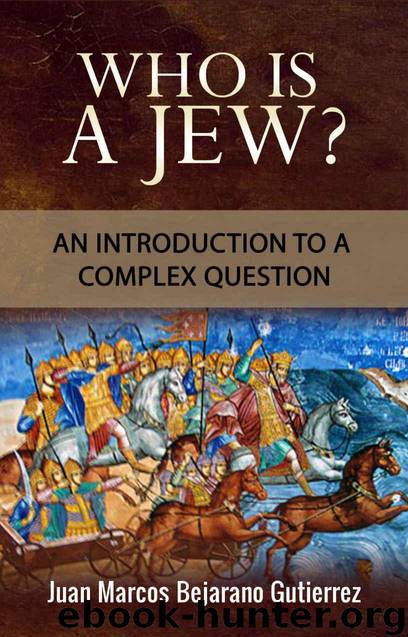Who is a Jew?: An Introduction to a Complex Question (Introduction to Judaism Series Book 3) by Rabbi Juan Bejarano-Gutierrez

Author:Rabbi Juan Bejarano-Gutierrez
Language: eng
Format: azw3
Publisher: Yaron Publishing
Published: 2016-09-07T22:00:00+00:00
What Defines an Apostate?
The term apostasy is derived from the Greek word ἀποστάτης, which can be translated as a political rebel. It was applied to a person in rebellion against God, the Torah, and the faith of Israel.[47] Apostate Jews abandoned Jewish observance or had joined another religion. In rabbinic literature, the terms mumar literally "the one that is changed" and poshea yisrael literally, "transgressor of Israel", or simply kofer, literally “denier” were also used to designate apostates.[48]
The Tosefta states, “But as to the heretics (minim), the apostates (meshummadim), the informers, the apoqorsim, who have denied the Torah, those who have separated from the ways of the community, those who have denied the resurrection of the dead, and everyone who has transgressed and caused the public to transgress…Gehenna is shut in their faces, and they are punished in it Gehenna forever and ever.” [49] Apostates were counted as the enemies of Israel per the Mekhilta, and to be despised as instructed in the Avot de Rabi Natan.[50]
The Mishnah does not use either mumar or meshumad, but the Tosefta, a contemporary law code with the Mishnah, defines the former term as:
“He who eats carrion and non-kosher meat, abominations and ‘creepies’ and pork, who drinks forbidden wine, or who desecrates the Shabbat and who is decircumcised. R. Yose b. Yehuda says, even he who wears a garment of wool and linen; R. Shimon b. Elazar adds even he who commits a transgression for which there is no natural desire.”[51]
The rabbis of the Babylonian Talmud believed that apostasy could be limited to the intentional rejection of even a single commandment. There was, however, a distinction between an individual who abandoned the dietary laws, Shabbat observance, etc. and those who participated in avodah zarah (e.g. offering libations to idols and worship of idols), however. Only the latter, as well as those who had abandoned the entire Torah, could be regarded as complete apostates.[52]
There were even distinctions among those that were deemed full apostates. The mumar le-te’avon (i.e. the apostate out of appetite or convenience) was distinguished from the mumar le-hakh’is (i.e. the apostate out of conviction or spite).[53] But whether a Jew was an apostate out of convenience or conviction, Talmudic sources condemned both types without leniency.[54]
Despite their punishment, the apostate remained irrevocably Jewish in some ways. In Hullin 5a, we learn that “All are valid to slaughter, even a Samaritan, even an uncircumcised man, and even an Israelite apostate.” In response to this, the scholar Jacob Katz notes that the apostate remains designated as Israel mumar. Israel continued to be the substantive identity while mumar was the descriptive element. [55] In practical terms, though, the apostate was treated as a non-Jew.[56]
Download
This site does not store any files on its server. We only index and link to content provided by other sites. Please contact the content providers to delete copyright contents if any and email us, we'll remove relevant links or contents immediately.
| Haggadah | Hasidism |
| History | Holidays |
| Jewish Life | Kabbalah & Mysticism |
| Law | Movements |
| Prayerbooks | Sacred Writings |
| Sermons | Theology |
| Women & Judaism |
The Secret Power of Speaking God's Word by Joyce Meyer(2704)
Man's Search for Meaning by Viktor E. Frankl(2533)
Mckeown, Greg - Essentialism: The Disciplined Pursuit of Less by Mckeown Greg(2309)
MOSES THE EGYPTIAN by Jan Assmann(2254)
Devil, The by Almond Philip C(2181)
Unbound by Arlene Stein(2158)
The Complete Dead Sea Scrolls in English (7th Edition) (Penguin Classics) by Geza Vermes(2111)
I Capture the Castle by Dodie Smith(1875)
Schindler's Ark by Thomas Keneally(1744)
The Invisible Wall by Harry Bernstein(1686)
The Gnostic Gospel of St. Thomas by Tau Malachi(1653)
The Bible Doesn't Say That by Dr. Joel M. Hoffman(1594)
The Secret Doctrine of the Kabbalah by Leonora Leet(1513)
Political Theology by Carl Schmitt(1483)
The Jewish State by Theodor Herzl(1457)
A History of the Jews by Max I. Dimont(1417)
The Book of Separation by Tova Mirvis(1410)
The Dead Sea Scrolls Bible by Martin G. Abegg(1402)
Oy!: The Ultimate Book of Jewish Jokes by David Minkoff(1278)
